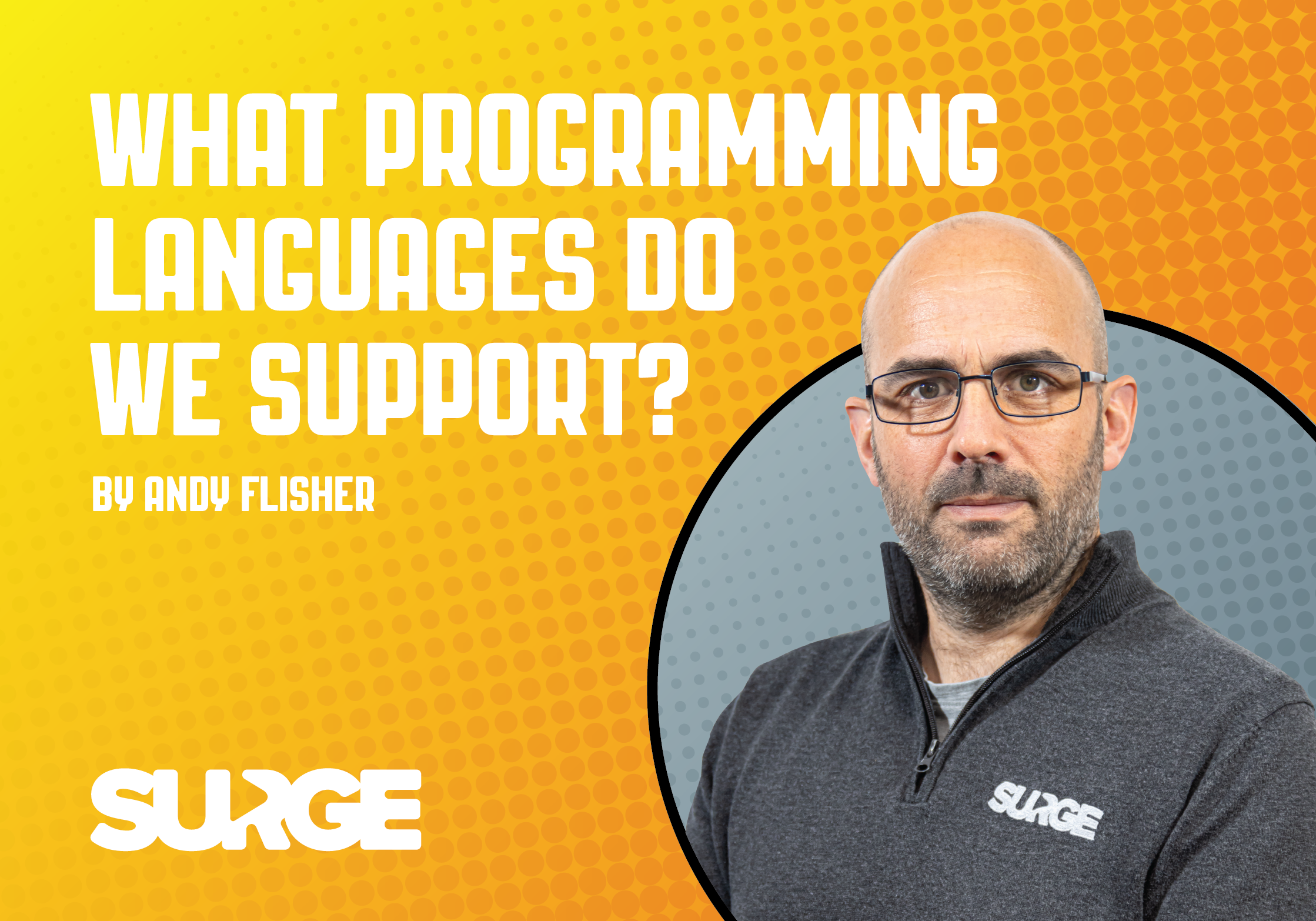
It’s a question we get asked a lot at Surge.
“What programming languages do you support?”
The honest answer?
It depends. (As I often say: "It all depends.")
Every project is different. Every business has its own requirements.
And rather than locking ourselves into one language or framework, we’ve built Surge to be flexible.
Our job is to create the right digital solution for you.
And that means we choose the programming language based on what works best for your business, not what happens to be easiest for us.
A lot of agencies specialise in one language, and that’s not wrong.
But for us, being able to work across multiple languages means we’re able to build solutions that actually fit your systems, your integrations, and your long-term goals.
Let’s break down exactly what that means in practice.
The Web Development Languages We Work With
Most of the solutions we build are web-based.
That could be anything from brochure websites, ecommerce platforms, software systems, or complex web/mobile applications.
Here’s where we tend to work:
HTML / CSS / JavaScript – The core building blocks of any website.
PHP – Our go-to language for ecommerce solutions, CMS platforms, and much of our web-based software.
C# (.NET) – Developed by Microsoft and widely used for enterprise software, integrations, and business-critical systems.
Java – Still very common in certain enterprise platforms, especially older systems.
Node.js / React / JavaScript frameworks – Where requested, we work with full-stack JavaScript solutions like Node or React depending on client needs.
The key here is flexibility. We’re not restricted to one option.
We evaluate the requirements of the project and select the language that makes the most sense for you.
The Mobile Development Languages We Work With
When it comes to mobile apps, the language is often dictated by the platform.
iOS (Apple)
Swift – The current first-party language for Apple platforms.
Swift UI – The latest development framework built on Swift.
Objective-C – Still very common for older apps that we often inherit and continue to support.
Android (Google)
Kotlin – Google’s preferred modern language for Android.
Java – Still widely used for older Android apps.
Groovy – Occasionally used in certain Android environments.
Cross-Platform Solutions
C# (with MAUI, formerly Xamarin) – Write once, deploy on both Android and iOS. Ideal for business applications.
React Native – A JavaScript-based solution for building apps across both platforms.
The choice between native and cross-platform is always driven by your project goals, long-term maintenance, and how the app needs to function.
The Desktop Software Languages We Work With
While desktop apps are less common now, we still support and build software for businesses that need them.
C# (.NET Framework and .NET Core) – The most common platform for modern Windows desktop apps.
Kotlin – Occasionally used for cross-platform desktop development.
Visual Basic – Still used for legacy desktop applications that we often inherit.
Java – Sometimes still used in older enterprise desktop systems.
Mac/Linux – We work across all operating systems when required.
If you’ve got older desktop software that still runs your business, we can help support, modernise or migrate it.
What About Databases?
Behind the code, you always have the database. This is where your business data actually lives.
We regularly work with:
MySQL / MariaDB – Frequently paired with PHP-based solutions.
Postgres – A strong open-source alternative used widely in web app development.
Microsoft SQL Server – The standard for .NET and enterprise platforms.
SQLite – Lightweight and useful for smaller applications.
Microsoft Access – Still very much alive in some businesses, we often help clients migrate Access databases to more modern platforms.
As with programming languages, we’ll always recommend a database solution that supports your business needs both now and long-term.
Other Languages and Platforms We Still See
There are also a few that deserve an honourable mention:
Python – Becoming increasingly popular for custom AI models, data science and machine learning.
Perl – An older server-side scripting language that still powers some legacy Unix-based systems.
If you’re using something that seems a bit obscure or niche, chances are we’ve seen it before.
So, What Programming Languages Do We Support?
In short:
The ones that fit your business.
We don’t try to force every project into a single platform because that’s what we happen to know.
Instead, we build solutions based on:
The systems you already have
The integrations you need
The platform your business is built around
How future-proofed and supported the language is
What will give you the most reliable, maintainable system moving forward
That means you're not locked into one way of working, and you’re not building yourself into a corner that’s hard to get out of in future.
What Happens Next?
If you’re not sure what language your system needs, don’t worry, that’s our job.
Whether you’re looking for:
New custom software
App development
Web system builds
Legacy support and modernisation
Or simply advice on how your current system can evolve
We’ll help you work out the right path, and build a solution that’s properly fit for purpose.